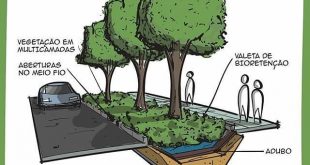by Beatriz Lourenço
In the Northeast region of Brazil, the semi-arid climate is present. According to data from Embrapa (2007), the region had 1.56 million km², which corresponds to 18,2% of the Brazilian territory; in addition, the region also has most part of the semi-arid region of the country, bringing remarkable characteristics, such as scarce and poorly distributed rainfall, being the hottest climate in Brazil, with temperatures that usually vary between 20ºC and 30ºC. Other striking points of this climate are the low annual temperature range and the low relative humidity of the air. The characteristics of this type of climate have increased risks to agricultural activities and facilitated the process of environmental degradation resulting from these practices.
One of the most serious consequences brought about is the accentuation of the process known as desertification\; the process by which areas originally covered by vegetation become desert or semi-desert due to a combination of natural factors and human activities. The main causes of desertification include: climate change and human activities such as unsustainable agriculture, deforestation, overgrazing, controlled irrigation and overexploitation of natural resources; use of natural resources; population growth; insufficient development; disorderly urban sprawl and poor resource management practices.

In this way, it is noted that the procedures carried out in agricultural activities help to accelerate the process of desertification in these areas, mainly when considering the relevance of these activities for the economy of the northeastern region.
According to ‘César Nunes de Castro’, a researcher at the Directorate of Regional, Urban and Environmental Studies and Policies (Dirur) at IPEA, agriculture has great prominence among the economic activities in the Brazilian Northeast, being varied in terms of cultures, with sugarcane being sugar the main crop.
Thus, it was possible to observe the importance of studying and applying practices and processes that would help to slow down the desertification process, and, based on this, the Law Nº13.153, of July 15th, 2015, was sanctioned, and it institutes the Politic of Desertification and Mythification of the Effects of Drought. This Law seeks, in short, to define the concept of desertification, present its factors, vectors and processes and propose forms of combat.
Did you like the content? Read our articles, which will certainly help you in many ways. Also visit our Instagram @inqportal and if you want to send us any suggestions, this is our e-mail: inq.vdc@ifba.edu.br
 InQ.IFBA Portal da Inovação & Qualidade
InQ.IFBA Portal da Inovação & Qualidade



